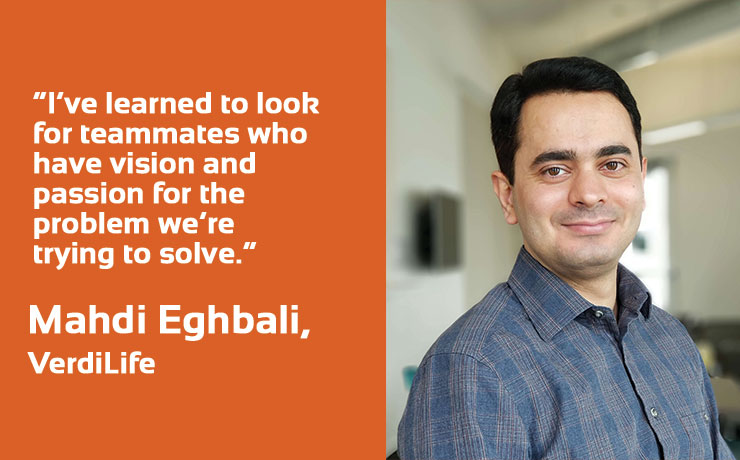
An innovator’s journey from idea to market can be challenging and complicated—but also rewarding. Our Innovator Spotlight series explores how inventor-entrepreneurs in our network have evolved since they started their journey. Our goal is to share key learnings and best practices with early-stage science and technology inventors embarking on a path of innovation and entrepreneurship. Our latest Innovator Spotlight is Mahdi Eghbali, founder and owner of VerdiLife. Eghbali is an E-Team grantee. VerdiLife is developing a waste recycling process that can produce organic fertilizer and pesticide solutions and is carbon-negative with zero emissions.
What challenge did you seek to solve with your innovation and why?
VerdiLife strives to make Earth a healthier planet by replacing harmful chemicals in agriculture with all-natural materials. Our technology decomposes all types of biomass into fully organic fertilizer and pesticide for commercial agriculture purposes. Our long-term plan is to invest, install, and run several decentralized plants across the U.S. to help mitigate the negative impacts of agro-chemicals in agriculture while improving the waste management ecosystem.
What have you learned along your innovation and entrepreneurship journey?
The biggest lesson I’ve learned is to look for teammates who have vision and passion for the problem we’re trying to solve. It has been the most useful way to predict what someone can add to the company. Some previous team members did not work out despite having all of the necessary skills on paper. They lacked the overall vision and passion required to help take the company to the next level. I’ve started to value an individual’s passion and values more than their given skill level. You can teach skills, but you can’t teach passion or vision.
Tell us how you’ve integrated environmentally responsible practices into your innovation or process?
Unlike agro-chemicals that are made from oil and petroleum materials, we use wood waste that should otherwise be burned or dumped in landfills, manure that causes air pollution and nitrate runoff, and food waste that release methane gas into the atmosphere. Our production process produces its own energy, which makes it a unique self-sustaining and carbon-negative system. And through that carbon (biochar), we help improve wastewater management by recovering phosphorus and nitrogen for reuse on the farm where it can recharge soil biology. This can solve a critical broad-based, long-term problem all farmers face by sequestering tens of thousands of tons of carbon over the life of just one system.
How has support from VentureWell impacted your innovation and venture?
VentureWell helped us test our assumptions. We now have a better understanding about our industry and value propositions. The E-Team program also allowed us to share our thoughts and plans with other innovators and entrepreneurs to ensure we are on the right track toward our business goals.
What’s next for you?
We have produced prototypes that are being tested in several laboratories. The initial results are very promising, and we plan to do further research to study the benefits of wood vinegar in agriculture. While the project is at the pre-revenue stage, we have received a lot of interest from farmers to pre-order our products. We’ve also received several letters from the Office of Forestry Services asking us to help them manage their wood waste. We are also working closely with the EPA and USDA to register and certify our product as a verified organic product and bio-based product. We plan to fully commercialize and fulfill the pre-orders by the end of 2019.